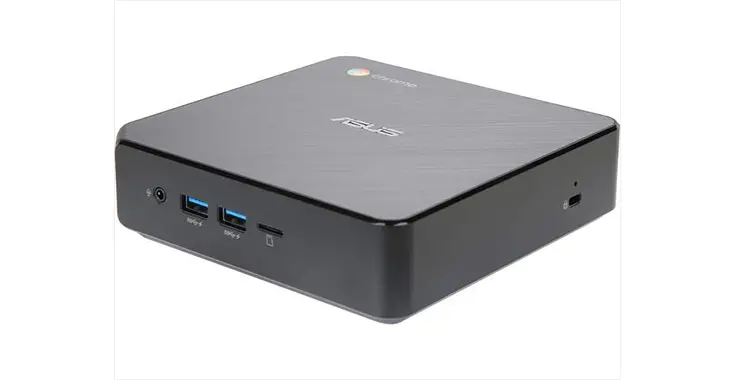Table of Contents
Chromeboxes have been around since 2012, but you might not have heard of them until recently. If you’re looking for an alternative to the traditional desktop computer that is more lightweight, more compact, more cost-effective and altogether more straightforward to use, then a Chromebox may be the answer.
There are plenty of things to consider when weighing out which one to invest in—if any. This run-down will explain what exactly a Chromebox is, how it differs from a traditional set-up and what some of the pros and cons are to owning one.
For a detailed look at some of the Chromeboxes currently on the market, look no further.
What is a Chromebox?
A Chromebox is a compact desktop computer that uses the Google Chrome operating system. They are lightweight and portable alternatives to traditional desktop computers which comes with a number of advantages that may suit your particular needs.
Much like traditional desktop computers, Chromeboxes do not have screens. There are few, if any, buttons beside the power button. What the Chromebox does have is several ports for wired WiFi, HDMIs and USBs. This allows you to plug-in peripherals such as a monitor, a keyboard and a mouse.
Chromebox is produced by many big-name brands including Acer, ASUS, Dell, HP, Promethean, and Samsung.
What are the Advantages of Owning a Chromebox?
Here's a list of the main advantage of this device.
Affordable Price
The least expensive Chromeboxes are available for a little over $100. The ASUS Chromebox-M004U Desktop is available for $129 and is the smallest device of its type on the market. It comes with an Intel Celeron processor and 2GB of RAM.
At the higher end, Chromeboxes can set you back as much as $440. The Acer CX12 4GKM Chromebox is around four times the price of its cheapest alternative but comes with 4GB of RAM, a 16 GB Solid State Drive and a keyboard and mouse to boot.
In comparison to a traditional desktop computer, a Chromebox will likely save you as much as 30%.
Cloud-Based Application Users
Chromeboxes are ideal for those who mostly or exclusively use Cloud-based applications for their work or entertainment. Anyone using G Suite will be able to easily use their Chromebox without any storage issues.
Automatic Updates
There’s no need for new software as all updates are automatically managed by Google. This saves time and effort, as you do not need to manually update every piece of software or app you use.
Virus Free
There is no need for anti-virus software when it comes to Chromeboxes. With little to no virus vulnerabilities, you can rest assured that your device is safe from malware. This can save money on anti-virus software and gives you peace of mind that your device will not break down or get frozen up from a virus.
Low Maintenance
Chromeboxes offer very low maintenance and support. You will not need to call for specialist help to troubleshoot problems when using one of these devices. Issues can largely be dealt with without fuss or added cost.
Power Wash Button
This button will enable you to reset and reinstall the Chrome Operating System whenever you encounter any issues. It’s easy to use, avoids costs of professional troubleshooting, technical support or repairs and saves you a lot of time and hassle. This feature makes Chromeboxes incredibly reliable, so you won’t have to worry about any unforeseen problems.
Fast Speed
Chromeboxes work smoothly and quickly thanks to their onboard storage and serviceable levels of RAM. Cloud-based programs will work as fast as your internet connection will allow them to.
What are the Disadvantages of Owning a Chromebox?
Here's a list of the most relevant Chromebox cons:
Requires Internet Connectivity
One drawback to Chromeboxes is the need for a reliable internet connection in order to operate effectively. This can be bypassed if your Chromebox is purely intended for home use or in a work setting. However, if you’re on the go, this may cause issues.
The amount of offline applications is limited. Most things you’d want to do are web-based, so an internet connection will be vital.
Limited Storage
Storage is certainly limited when compared to a traditional desktop computer. Chromeboxes come with limited storage, so if you intended to download large files or software, you may want to reevaluate your options. It’s essential to back things up using the cloud to make the most of the limited space.
Which Model Should I Get?
Like all devices, there are several different options depending on your price range and needs. As previously mentioned, prices range from just over $100 to upwards of $500 so there is a lot to choose from.
Extra expenditure will get you more internal storage, RAM, additional ports and added extras such as keyboards.
Bottom Line
Whether you should own a Chromebox is entirely down to your specific needs. If you are the sort of person who can cut out all the unnecessary extras a tradition computer provides and want something more portable, compact and aesthetic, a Chromebox is certainly something to consider.
Anyone who works exclusively on the cloud can definitely benefit from this low-cost alternative to a traditional computer. However, if internet connectivity or storage space is an issue then a Chromebox may not be exactly what you need.
Browse the options, weigh up the pros and cons and see if a Chromebox is right for you.

